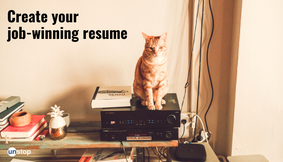Grow Beyond Better 2026
Here is how you can respectfully disagree in a job interview -By Soumya from IIM Visakhapatnam

This demonstrates a person's ability to think for themselves and the ability to debate which often leads to a healthy discussion. We need to understand a great candidate, for the job needs to possess more than just skills and experience. These in specific are the ability to stand up and speak for themselves. But how you proceed with disagreements and put forward your opinion during an interview without hurting the interviewer's pride is a skill which needs to be developed and speaks a lot about your ability to handle conflicts. Let's look at a few suggestions that can help you smoothly disagree during your job interview.
Choice of words and a diplomatic approach
Every person is unique and holds a belief born from the circumstances faced by them. An interviewer is no different and challenging their beliefs can hurt their pride. So, in these situations, instead of blatantly disagreeing with their statement, it's better to use phrases like “I hold a different perspective on this matter” and proceed with your statement.
You can also tell the interviewer that you have a different experience and share it with them if they like. This will help you in persuading the interviewer. This would ensure the interviewer remains open to your ideas and doesn't act hostile out of defence for having his opinions challenged.
Think before answering
As a natural instinct, people tend to answer immediately, with the first thought that strikes their mind. This might create an impression of desperation in front of the interviewer. Taking some time to think about the question before answering demonstrates calmness and patience in your personality. It also helps in gathering your thoughts and presenting your points more rationally. This can help you debate with the interviewer candidly.
Understand the interviewer
During the conversation, try and determine if the interviewer is receptive to new ideas. This is important in judging if the interviewer is someone that can be reasoned with. Research about the company culture and people in it. This might give you an idea of their thinking pattern and how acceptive they are to differing ideologies. Not only will this help you determine if it's risky disagreeing and losing the opportunity, but also understand whether or not the organisation suits your personality.
Start on a positive note while confronting opinions and ask questions
When approaching someone with authority as the interviewer, in this case, it is better to subtle and diplomatic. Point towards the pros of his opinion and then present the part you disagree with him on. This keeps them interested in your view while at the same time keeps their pride intact.
Moving on to the next part, why should you initiate a question? Asking question implies that you have a curious mind and an intent to foster a collaborative discussion rather than a heated debate with the interviewer. For instance, instead of stating that the company should better invest in xyz field, you could mould your sentence in the following way: “Could we profit more if we invest in xyz field? What do you think?”
At the end of the day, you need to keep in mind that any job interview is a two-way communication and you must be able to tactfully disagree. If you cannot express your opinion in an interview, it is hard to imagine that your thoughts would be welcomed once you join the organisation. Even if that is not the case, the inertia from the interview might act as a barrier to expressing your thoughts during discussions. So, while the interviewer is busy judging if or not you are a good fit for the company during the job interview, make the most of the opportunity to determine if their company’s ideals match yours. Good luck!
This article was submitted as an entry to Become an Author 2.0 with Dare2Compete.
Login to continue reading
And access exclusive content, personalized recommendations, and career-boosting opportunities.
Don't have an account? Sign up














Comments
Add comment